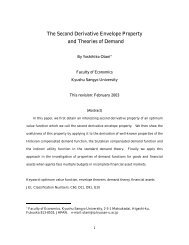PROGRAM
PROGRAM
PROGRAM
Create successful ePaper yourself
Turn your PDF publications into a flip-book with our unique Google optimized e-Paper software.
IEEE UIC/ATC Joint Panel on<br />
Smart Planet Challenges: Impediments and Enablers<br />
Panel Chair: Professor Sumi Helal, University of Florida, USA<br />
Panelists:<br />
Professor Christian Becker, University of Mannheim, Germany<br />
Professor Wanlei Zhou, Deakin University, Australia<br />
Professor Zhiwen Yu, Northwestern Polytechnical University, China<br />
Professor Jadwiga Indulska, University of Queensland, Australia<br />
Kazuo Iwano, Mitsubishi Corporation, Japan<br />
Recent advances in Pervasive Computing and Intelligent Environments research give a glimpse into the future of<br />
our planet and reveal exciting visions of smart everything - smart cities, smart homes, smart workplaces, smart hotels,<br />
smart schools, and much more. Driven by technological evolution offering low power many-things and wireless<br />
almost-everything (e.g., IEEE 802.15.4 radio, wireless sensor networks, sensor platforms), we could, in only a decade,<br />
envision and prototype impressive cyber-physical systems and ubiquitous applications. In most of these systems, the<br />
goal has been clear and convincing, and the technology proved to be promising and exciting. But prototyping is only a<br />
beginning, and much remains to be innovated and done before smart cities and smart environments become common<br />
places.<br />
This panel will discuss the exciting and promising future of smart planet in terms of the challenging impediments<br />
and the potential enablers. Some of the challenges include:<br />
The need to integrate research and education across disciplines. Many research disciplines must collaborate<br />
among and within themselves, including domain experts (of the particular environment, e.g., gerontologist for<br />
assisted living spaces), behavior scientists, engineers, computer scientists. Collaboration within the computer<br />
science and engineering discipline is key enabler to a smart planet.<br />
The need for novel cyber-physical software architectures. Systems support and middleware are essential<br />
foundation to building any systems – a smart planet is no exception. Software engineering is urgently needed<br />
to understand and support the full lifecycle of intelligent environments and smart spaces. New programming<br />
models are also needed for developing safe and adaptive applications and services. New notions of trust must<br />
be formulated and supported to ensure symbiotic relationship between the users and their smart environments.<br />
Broader support is needed for effective human computer interaction. Understanding the broader requirements<br />
of human computer interaction is crucial for both individuals and the masses. Effective persuasion is also<br />
proving to be of paramount importance to the success of the operation of such smart spaces.<br />
The need to integrate computational intelligence with systems research. Without machine learning and<br />
computational intelligence techniques, the potential utility and “ceiling of goals” of smart spaces would be<br />
severely limited. Without expanding the computer system’s research to encompass proven and established<br />
machine learning and computational intelligence techniques, it will be difficult to increase the capacity of<br />
appropriately trained smart space engineers.<br />
Panelists will present their position statements and highlight what they identify as challenges and enablers to<br />
smart planet progress and advancements.<br />
10




